Ever since releasing in November 2012, the free-to-play MMOFPS PlanetSide 2 has survived, and enjoyed, nearly eight long years of life — a venerability that many of the long-dead MMORPG projects from the late 2000s and early 2010s could only dream of.
For nearly 17 years, PlanetSide and its sequel, PlanetSide 2, have occupied a niche of MMO-dom that broadly similar titles like World of Warcraft and even the Destiny series have never sought to venture upon: large-scale warfare — like that of a Battlefield game — with persistent characters and servers that can host massive assaults and battles between hundreds of concurrent players at one time.
Now that the franchise is approaching its 17th anniversary, developer and publisher Daybreak Game Company (previously Sony Online Entertainment, or SOE, until its reformation in 2015) has decided that it’s finally time to kick things off for a new turn in the franchise’s development.
Under the command of Rogue Planet Games, the studio that spun off from Daybreak Game Company earlier in 2020 to focus solely on the development of the PlanetSide series, PlanetSide 2 has already launched a brand new update in 2020, called the Escalation update.
To gain a clearer insight into the update’s development and what it means for the game, we sat down with Andy Sites, the Executive Producer of PlanetSide 2, and the head of Rogue Planet Games.
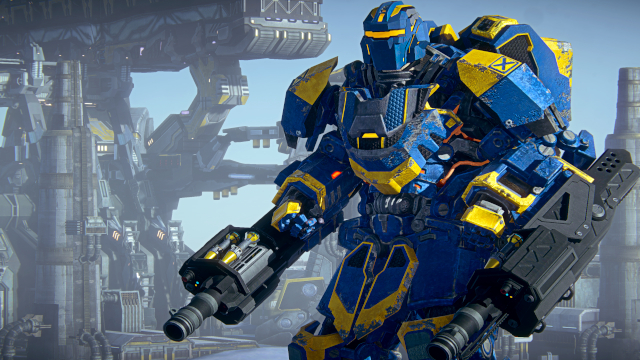
GameSkinny: From the top, give me a state of the game, because I haven’t really been following PlanetSide 2 since it launched in 2012. It’s been eight years since I played it, and I know that Daybreak is kind of split off into three different micro-companies.
Andy Sites: Yeah. So, you know, as you mentioned, we launched the game almost eight years ago, back in November of 2012. And the game has been pretty healthy. But over the years, we’ve been declining a bit in players. And really over the last three years, the number of updates and features and content going out slowed down quite a bit.
Just because we’d pulled a lot of people off the team to help on the various other projects. And towards the end of last year, when the decision was made to spin off the sub studios, and to really … [have] franchise-focused efforts by each one — with Rogue Planet being focused on PlanetSide 2 — we wanted to really kind of reengage and double down on the effort that we’re putting into PlanetSide.
And like all MMOs, if it’s successful, it could last not just eight years — it could last, like in EverQuest 1‘s case, 21 years or longer. So, towards the end of last year, we ended up ramping the team up to about three times the size of what it was.
Today, we’re three times larger than we were just six months ago. And part of that was the roadmap that I had put together and the proposal to get the increased team size approved for this year. And … rather than just talk about how we’re going to improve the game, we wanted to show how we were going to improve the game through an actual meaningful, big update.
So we kind of went silent towards the end of the year. And then, when we announced the inception of Rogue Planet Games, we started interacting with the community a lot more. We were able to start getting more updates out just because of the increased team size. And then in early February, we announced the first big beat of our 2020 roadmap, which was the Escalation update.
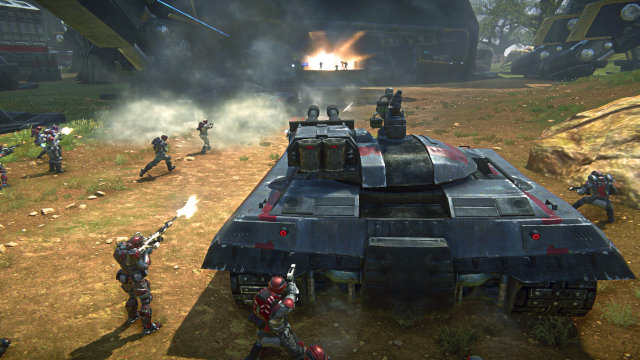
AS: To say that we were confident in the features and everything … we really had no idea we were gonna have the reaction that the community had when it was actually released. We had originally planned to roll it out towards the end of February and we started doing a lot of playtesting with the community. At first, it was invite-only for several weeks through our private public test server. And then once we decided that it was time to start scaling it up, that it would be just a little too difficult to do invite-only.
So in an effort to ensure that we were going to not only make a splash, but [that] it was going to be a really positive splash, we actually ended up delaying the update three weeks to the 11th of March. And we were a little concerned about delaying that long because we had announced the release date early in February, and we really wanted to stick to it. But at the same time, we knew that we had to get this right because we had a lot of eyes on us.
We’ve had over 16 million [players] on PC and PS4 since the game released. We wanted to get as many of those players to come back as possible, so we knew we needed this update to be highly polished and really stable. So, fortunately, the community was very appreciative of us holding it and not releasing it and then hotfixing all the issues once it went live. We held it for three weeks, we rolled it out — and again, we had high expectations — but they exceeded every expectation we had.
Concurrent player usage is the highest it’s been since the beginning of 2014. The number of players coming in each day is the highest it’s been in over four years.
GS: So I have followed a few of the more recent updates recently. I know that there was a battle royale update that came out recently. And I’m just curious about like, how did that impact the player base? Was it something that gained traction with the player base? Or was that something that didn’t do as well?
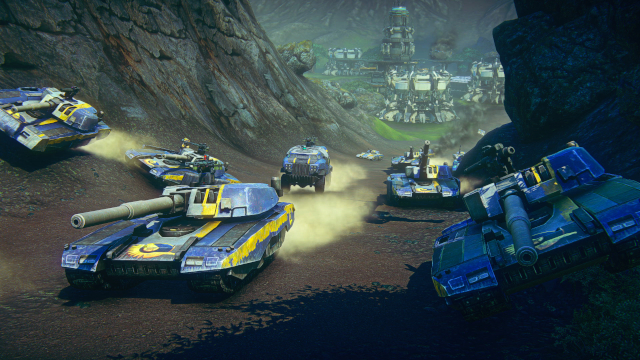
AS: Yeah, so it wasn’t an update. It was a separate game called PlanetSide Arena. It was definitely a polarizing decision because our plan long-term was for PlanetSide Arena to not be a standalone battle royale game. Our intention was to go into Early Access and not really do any sort of major marketing, just because we wanted to iron out all the kinks.
And really, the thing that kind of put the nail in the coffin was going into Early Access with just the battle royale. Even though we incorporated some changes that lent themselves well to PlanetSide — like it was much larger-scale, it had much larger team play, we did a lot of stuff gameplay-wise that sped up the mechanics and the match experience — at the end of the day, the PlanetSide community loves PlanetSide for what it is, which is an ongoing, massive-scale, never-ending battle.
Battle royale was not something that they were excited about. They were excited about the various arena modes, but unfortunately, we just didn’t have those ready at the time that Early Access began. And because of that, we just didn’t get the traction that it needed.
Frankly, we knew that PlanetSide 2 would be better off with our focus back on that. So we decided to shut [PlanetSide Arena] down earlier than we had hoped for, so we could basically get back to focusing on PlanetSide 2, which is what happened toward the end of last year.
GS: Were there any specific things that worked really well in PlanetSide Arena that you implemented into PlanetSide 2?
AS: Yeah, I mean, for example: We made some fairly significant engine improvements for PlanetSide Arena, because the PlanetSide 2 core engine was developed over eight years ago at this point. We did some fairly significant server and graphics optimization improvements in PlanetSide Arena that we ended up carrying over to PlanetSide 2.
There are a lot of learnings from some of the mechanics that we’ve carried over. There’s also a lot of things that we learned that we were considering carrying over to PlanetSide 2, that just once we got them into PlanetSide Arena and then evaluated them for PlanetSide 2, we decided it just wouldn’t be a good fit.
So much like all the MMOs that we’ve worked on over the years — PlanetSide, EverQuest and such — we like to innovate, we like to try new things. So we don’t have any regrets about the effort that we put into PlanetSide Arena with everything we’ve done before, we always like to learn lessons. We definitely learned some lessons with PlanetSide Arena on what works well and what won’t work well.
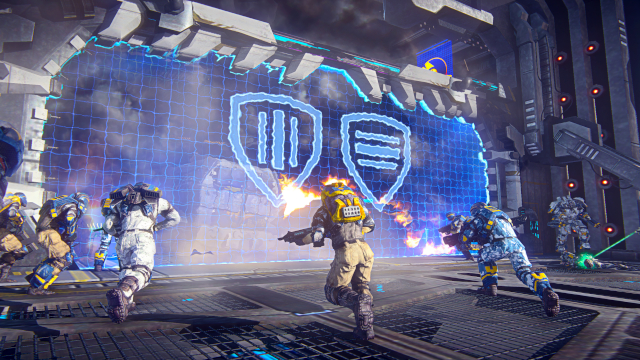
GS: Right. And you decided, or you rather discovered, that people really don’t care about battle royales when they’re playing PlanetSide as opposed to playing as the —
AS: Yeah, yet again: The long term vision for PlanetSide Arena was never to be just a battle royale game. It was meant to have the various types of arena modes that — when they were rolled out, the intention for the arena modes was to capture the massive scale and the fast-paced moments that you get in PlanetSide 2. Not quite as frequently, but it was basically a guarantee that you get in, play a 30-minute match, and you’re gonna experience some epic battles that you would, you know, you might not experience every time you play PlanetSide 2.
But, unfortunately, we just weren’t able to. The game didn’t live long enough to get all the additional arena modes done. So we cut bait and refocused our efforts back on PlanetSide 2, which is where we are today.
GS: So, what does the future of PlanetSide 2 look like in the wake of the Escalation update and this new roadmap?
AS: So like I said before, we really wanted the Escalation update to kind of set the bar for not only ourselves in terms of what we know we could deliver, but to set expectations with all of our players.
This update was the biggest update that had rolled out since the launch of the game. And even with that being the case, we’ve published some pretty big changes over the years. But one of the results from those previous updates would be [that] we get a lot of players coming back checking it out, but then we wouldn’t be able to follow it up with any real significant new features or new content updates for a while just because of the smaller team size.
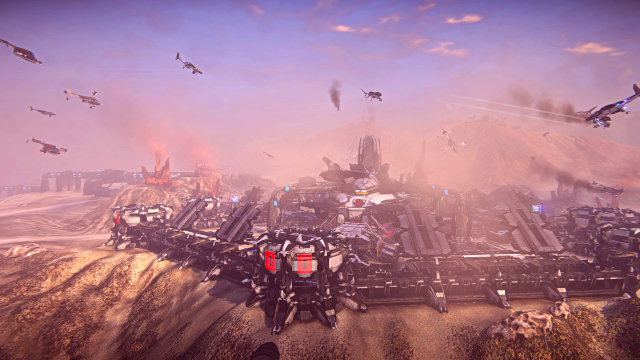
AS: Our intention beginning with the Escalation update was to roll out major beats like that, at least twice a year. And then between every four and six weeks, we roll out smaller themed updates that have new features, new content, new weapons, new vehicles, new changes to the world.
So, players that do come back, they don’t come back, enjoy the game for a month or month and a half, and then wonder when the next big update is going to happen. We don’t want anyone to have any reason to want to leave the game, so we have to convince them to come back again.
GS: What barometers are you looking for in the wake of the Escalation update. What are you looking for as a player response, in terms of how you gauge the success of the update and how you go forward with the next several updates?
AS: We have a lot of hooks in-game that help us understand what mechanics players are using, and where players are spending most of their time in the game and in the world. But really, it’s a combination of the anecdotal feedback we get from the community through social media and posts and such.
But it’s also just looking at the high-level data of the numbers that I told you before. Our peak concurrent usage is the highest that it’s been in six years. And there’s a reason for that. It’s because this update really resonated [with players].
Game development is completely subjective. So, those data points can help inform us of our decisions. But at the end of the day, we need to have our finger on the pulse of the community and the entire team really needs to understand what’s working well and what’s not.
GS: Do you ever look at forum posts and get feedback from what people are saying on the forums?
AS: Oh, yeah: [We get feedback] through Reddit, through our official forums, through Twitter. There are a handful of us on the team that are constantly interacting with the community.
GS: Do you have plans for a third PlanetSide game?
AS: Yeah. We’ve had plans for a third PlanetSide for a while now. Kind of like PlanetSide 2 compared to PlanetSide 1, there are pretty high expectations. We need to be confident that we’re not just adding a three and improving the graphics. We need it to be a revolutionary experience and not just a minor evolution of what PlanetSide 2 was.
So, we actually started doing design work over the last several months, but it’s still at a point where we’re not ready to start sharing any of those details.
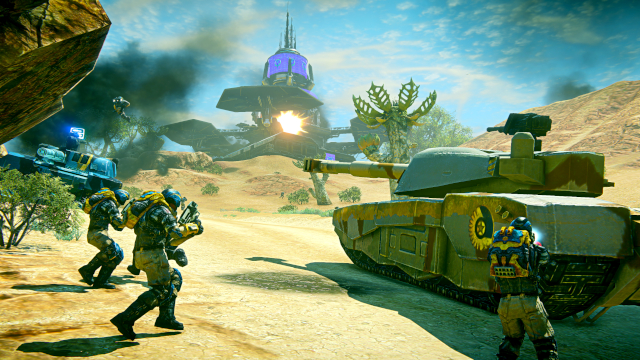
AS: But at the end of the day, it’s to make sure that this is going to resonate well with our community, and that it’s going to do the PlanetSide franchise justice. So, yes, we are absolutely working on it. Is there a timeline? No. But PlanetSide 2 is going to hit its eight-year anniversary this November.
I think that the updates that we’ve started doing this year, and the real kind of revival of the player base in PlanetSide 2 shows that PlanetSide 2 has a lot of life left in it. We’re going to continue focusing on that while we’re also continuing behind the scenes efforts on PlanetSide 3.
GS: Has the [COVID-19] pandemic affected the development of the PlanetSide franchise?
AS: The biggest, most obvious changes to the development situation [is that] the entire Rogue Planet Games team has been working from home for the past month-plus now. Fortunately, we’re a much larger team than we were six months ago, but we’re still reasonably sized and everyone is a very tight-knit team.
So everyone knows each other. Everyone’s fully engaged in PlanetSide 2 and the whole development process. … We were kind of expecting a decline in productivity just because of the logistical needs for when you go from everyone literally working within earshot of one another to everyone physically being miles from each other. But we’ve kind of just moved forward with business as usual with regards to how we’re developing the game.
We have our team meetings multiple times a week, we have our feature and content planning meetings, meeting whenever there are new update planning sessions in progress — and the only difference is instead of me being able to sit across the table from team members to discuss it and having a whiteboard behind us, we’re on webcams, and we’re on voice chat, just having these conversations.
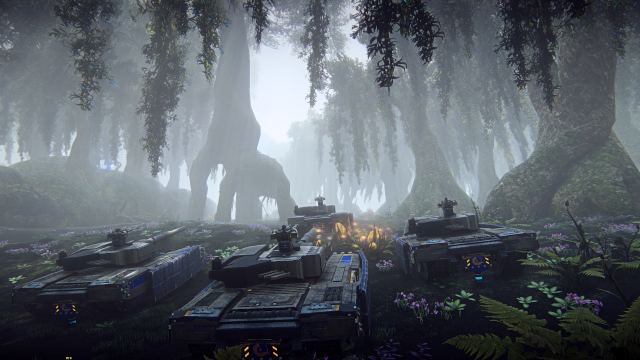
AS: So far it’s been pretty good. No major hiccups. And we’re going to continue planning on working this way for the foreseeable future. And there should be really no perceived difference for the player base with the exception of we’re doing our dev stream at the end of the month, and it’ll be the first time that we’re not broadcasting from the Daybreak broadcast room, and we’re all going to be connecting through webcams from our homes.
GS: Just from the logistical standpoint of running a division of Daybreak games, how does that really affect things like server uptime? And the technical side of running an MMO? Does [COVID] affect it, or?
AS: How does that work? You mean, now that we’re all working remotely?
GS: How do you keep the servers running? Who keeps them running?
AS: Fortunately, none of the live servers are actually physically based at Daybreak headquarters. They’re all located in various data centers throughout the world. Japan, Europe, East Coast and West Coast here in North America.
We’ve fortunately been able to kind of continue forward without skipping a beat because almost everything we do is done in some remote fashion. The Daybreak central tech ops team still runs all of our back end infrastructure. And those are all people that we typically interact with remotely anyway. Even though most of them are located in the same building, a lot of it’s done through messaging, chat channels, and over email and phone calls.
So the only real change has been just the development team’s physical location. So that’s really the main reason why we’ve been able to move forward without missing a beat; we haven’t had to change our short term roadmap in any way. The team has also done an incredible job of being able to adapt to this as well.
Every team member [at Daybreak] chose to be at these studios working on these games. So everyone that’s on Rogue Planet wants to work on PlanetSide 2, wants it to succeed, and wants to be proud of it. So it’s been really kind of business as usual.
GS: Okay. I think that’s gonna be it. Thank you so much, Andy.
AS: Yeah, no problem. And yeah, thanks for making the time, man. Thanks, Gabriel.
—
PlanetSide 2‘s recent Escalation update launched back in March. If you haven’t played it yet, it brought a lot to the game, including Bastion Fleet Carriers, War Assets, the persistent social hub Sanctuary, and heaps more. For the entire developer run-down, check the official announcement here.
Curious about trying the new update? You can grab PlanetSide 2 for free from the Steam store.






Published: May 26, 2020 06:05 am